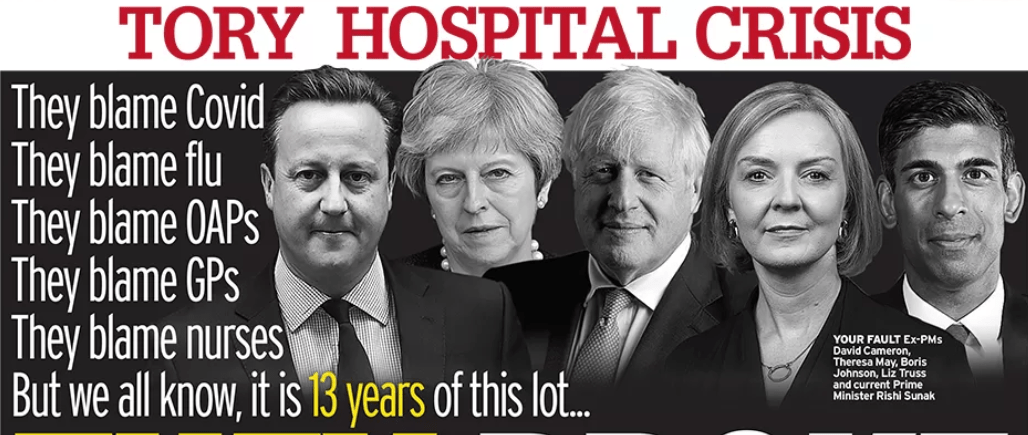One of the most important domestic political issues at the moment, if not the most important, is the dire state of the National Health Service. In a deliberate act of wanton destruction, the Tories are running the NHS down to a skeleton service – and a poor one at that – as part of a long-term strategy to privatise all health services in the UK.
We are faced with what all medical and nursing professional bodies agree is the greatest crisis in the history of the NHS. The Royal College of Emergency Medicine estimates that up to 500 people a week are dying as a result of delays to emergency care. One of the country’s leading health statisticians, was quoted in the Financial Times (January 4) as agreeing that “It is quite plausible that hundreds of deaths a week are associated with delays to admission”.
The newspapers are full of examples of the failures of the NHS, particularly in regard to A&E services. We republished here the anguished account of an A&E registrar trying day by day to do a decent job on behalf of his patients and almost despairing of the service provided. But much the same story is being repeated in the national press. The Belfast Telegraph reported that patients are being held so long in Northern Ireland A&E departments – the ‘lucky’ ones not in ambulances outside – that they are getting bed sores.
No workers should suffer cuts in living standards
There is general public sympathy for those workers who are currently fighting to maintain their living standards in the face of the highest level of inflation for decades. There is no justification for rail workers, civil servants, teachers, nurses, lecturers, firefighters, post workers or any other workers to suffer cuts in living standards, while in the sixth richest country in the world, millionaires and billionaires continue to enrich themselves week by week.
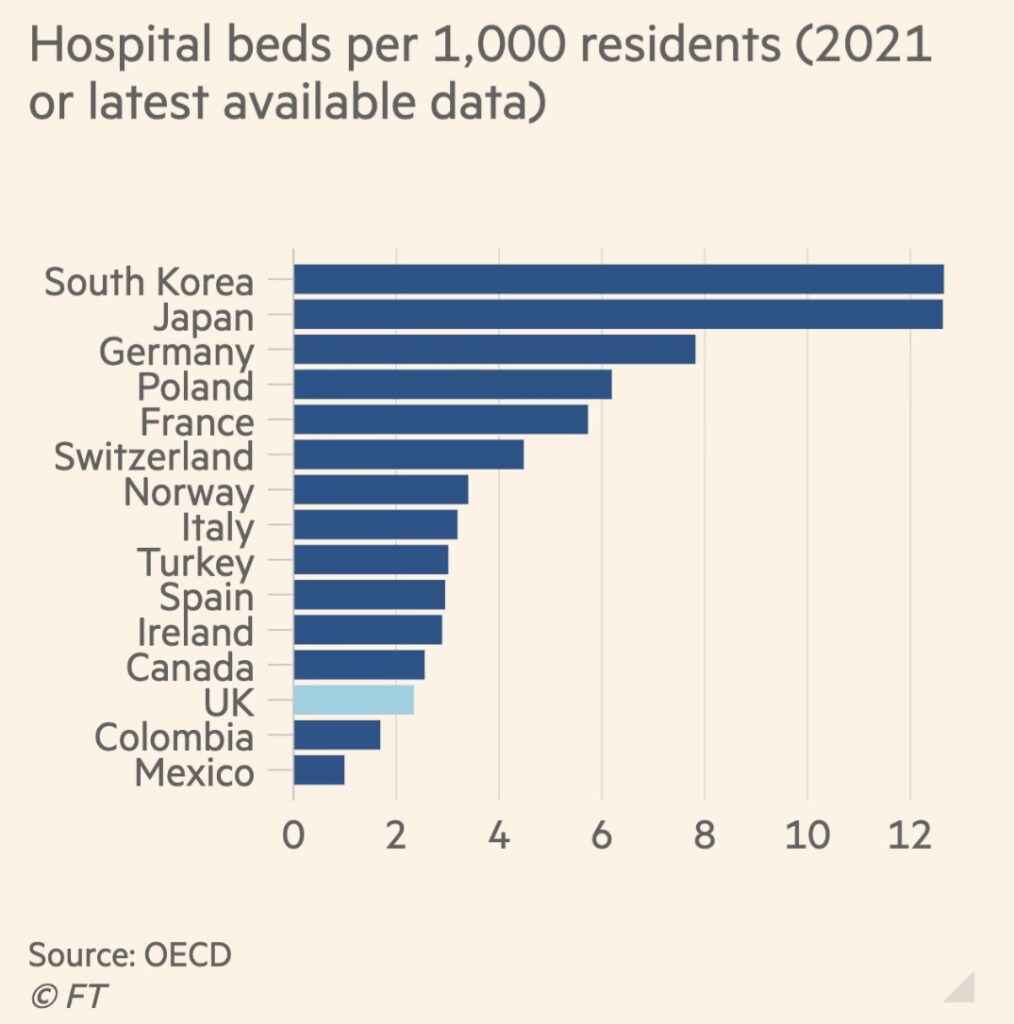
But the greatest public support is for paramedics and nurses, due to strike again later this month, and for junior doctors, who will soon join them. They might be fighting like other workers, just to keep their heads above water, but they are also in a desperate fight for the very existence of the NHS.
We should not be fooled for one moment by crocodile tears coming from Tory MPs or ministers. The Tory Party has always opposed the principles on which the NHS was founded – they opposed its establishment in 1948 – and they have a long-term strategy to privatise all of it by stealth, and to ‘encourage’ those in need of treatment to ‘go private’ by running down the NHS.
It is not out of economic necessity, but by political choice that the Tories have run down the NHS in the past twelve years of government. For once, as a result of public pressure being brought to bear, some of the mainstream media are reflecting the anger of the majority of the population against the Tories, such as the Daily Mirror front page yesterday. (Pictured above)
UK health spending is worse than any comparable country
As a result of twelve years of Tory policies, the UK now has one of the poorest health services in Europe, worse than most comparable countries. Spending on health, as a proportion of GDP, is among the lowest of the G20 countries. Up to a point that used to be understandable, because the underlying principle of the NHS – a health service funded by taxes and free at the point of use – is far more economic than private-based systems. But the decline in the spending/GDP ratio has become so steep in recent years that it has dramatically damaged the service provided.
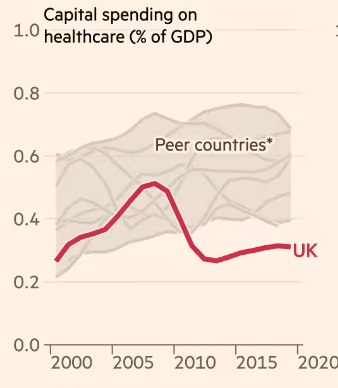
As the chart above shows, the UK has a smaller number of available hospital beds than any other comparable country, only a third of the number in Germany, for example. As is widely understood, the lack of beds that is forcing paramedics to sit in ambulances for hours waiting to discharge patients to hospitals, is partly due to the absence of an adequate social care system, another national scandal caused by privatisation. But when asked to point to one single cause of the admissions crisis, the President of the Royal College of Emergency Medicine, said, “it is that we do not have enough beds in our hospitals”.
Nor is it just beds. The UK has the lowest numbers of MRI scanners per head of population, compared to similar countries and the lowest numbers of CT scanners. These are not figures plucked out of the air by the left – they are published in the Financial Times, one of the serious organs of British capitalism, and they are an indictment of twelve years of Tory government.
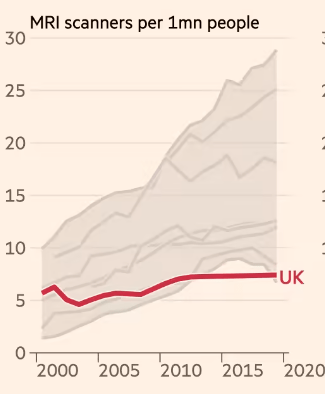
Tens of billions NHS underspend, while tax-dodging is rife
The Health Foundation think tank has estimated that average day-to-day health spending in the UK between 2010 and 2019 was £3,005 per person – 18% below the EU14 average of £3,655. Comparing the difference between UK spending and the EU average, shows, according to their figures, a shortfall of £40bn.
To meet expected demand, they estimate, would require a real term increase of 3.2% over the next ten years, an increase in spending of £70bn by 2030/31. Alongside this, we have London as the centre of industrial-scale tax-dodging that robs the Exchequer of tens of billions every year – something that gets a nod and a wink from this government of the rich and super-rich.
Rishi Sunak clearly lives in a parallel universe; he thinks the main issue facing the UK is not the crisis in living standards, nor the collapse of the NHS, but…a paucity of maths teaching. He has a ‘cunning’ plan – trailed in all the worst Tory newspapers as if it were a cure for all ills – to have maths taught to all students up to the age of 18. The only serious aim in this ‘plan’ – one completely oblivious to the shortage of qualified maths teachers and inadequate school budgets – is to create headlines that aren’t on the NHS or living standards.
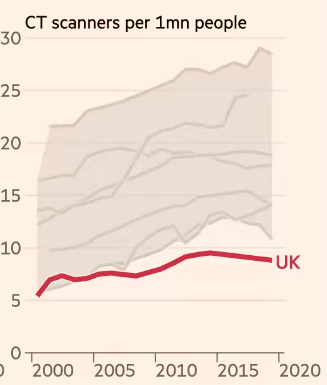
It was once said that the NHS is the nearest thing in the UK to a national religion. It was no accident that it was the main feature in the spectacular opening ceremony of the London Olympic games in 2012, much to the annoyance of Tory ministers. Despite decades of underfunding, a relentless downward drift in standards and facilities, the disheartening of the underpaid and overworked staff in the NHS – despite all of these things, there is still overwhelming public support for the principles upon which the NHS was founded.
Current Labour leaders a million miles from NHS founders
As we have argued before, on this issue alone Labour could not only win a general election, but it could galavanise a campaign that could drive the Tories from office long before December 2024. But unfortunately, the current Labour leadership are a million miles removed from their forebears, like Nye Bevan, who established the NHS. Indeed, if Bevan was in the Labour Party today, his ideas would be considered too ‘extreme’ and he might face expulsion from the Party.
Labour leaders should be pointing out the inadequacies of the funding of the NHS, but above all they should be drawing attention to the river of money flowing out of the NHS into private companies who sell drugs, equipment and services to the NHS.
PFI alone drains hundreds of millions of pounds. In the five years up to and including this financial year, the NHS paid out £7bn in payments to the holders of PFI shares – around £1.4bn every year. That alone would cover the pay rises demanded by nurses and NHS staff.
Going by resolutions passed at Labour conferences, the overwhelming feeling of Labour members and affiliated unions is that the looting of the NHS by private companies must be stopped. Labour needs to campaign for a fully-funded and fully public health service. That means the cancellation of all PFI contracts without further compensation. It means bringing IT, cleaning, maintenance and other services back in-house. It means the public ownership of pharmaceutical and other supply companies currently ripping off the NHS. Above all, it means paying NHS workers a decent wage and attracting more staff to the service by adequate training.
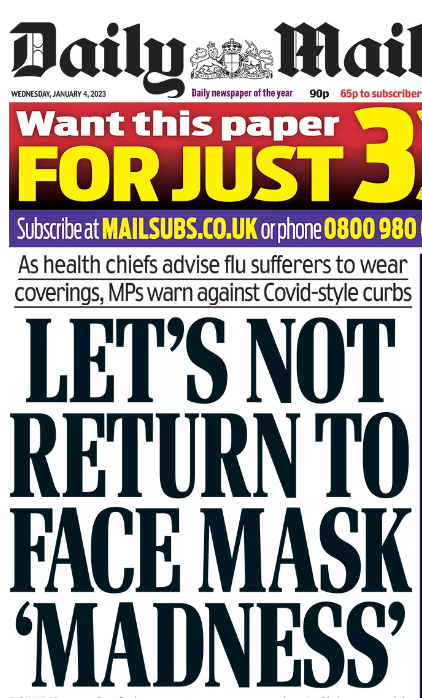
The private sector that leeches off the NHS
Sadly, these are not the policies of the Tory-lite Labour leadership. The Shadow Health Secretary, Wes Streeting, has made little or no effort to distance himself from the private health sector that leeches off the NHS and there is a suspicion among Party members that he would continue the creeping privatisation of the Tories. Keir Starmer’s major public speech today was specifically against the idea of a Labour government spending ‘too much’ – which is code for saying that his Labour government would also deny the NHS the funds it needs.
If the Labour leadership is incapable of campaigning effectively on the NHS, then the affiliated trade unions and the TUC must take up the gauntlet. On February 1, we will see the first coordinated strike action by all of those trade unions that have a ballot mandate for strike action. Even though the action is a broad one, against low pay in many different sectors, the TUC ought to put the NHS as the centre-piece of its campaigning.
Nearly five years ago, in May 2018, the TUC organised a mass rally in London in defence of the wages and standards of public sectors workers. The TUC, this Spring, ought to be doing the same again, but in every major city up and down the country, in defence of the NHS and its workers. It could potentially be the biggest political campaign in modern times.
Those unions that affiliate to Labour need to start putting pressure on the leadership to defend the NHS. It is not good enough for the leaders of the GMB and UNISON to ‘talk the talk’ and move motions on the NHS at Labour conference if they then, behind the scenes, give full backing to Labour leaders who do not support their resolutions. These union leaders need to decide whose side they are on – their members (and the public) who support the principles of the NHS – or a Labour leadership which does not.
Despite the weakness and ambivalence of the official parliamentary opposition to the government, public opinion can by itself be considerable political force. As much as Rishi Sunak and his ministers will want to blag their way through the deepest crisis in the history of the NHS, they will have their feet held to the fire over this issue. By-elections and local elections in May will tell a story.
For workers in the NHS and for the sick and the injured who cannot get adequate treatment, a political reckoning cannot come too soon. But however long it takes, there will be a reckoning.

